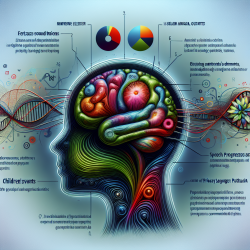Understanding and addressing the unique needs of individuals with Down Syndrome is a crucial aspect of providing comprehensive care and support. A recent study, titled A Clinical Study of the Auditory Brainstem Evoked Potential in Down Syndrome Individuals, sheds light on the significant prevalence of hearing impairment within this population and the unique characteristics of their auditory processing. This research not only underscores the importance of early detection and intervention but also provides valuable insights for practitioners aiming to enhance their therapeutic approaches.
One of the key findings from the study is the high incidence of hearing impairment among Down Syndrome individuals, with 59% of the participants exhibiting some form of hearing loss. This statistic alone highlights the critical need for regular and thorough hearing assessments within this demographic to ensure that any hearing impairments are identified and addressed promptly, thereby minimizing their impact on speech and language development.
The study also delves into the nuances of Auditory Brainstem Evoked Potential (ABEP) testing in Down Syndrome individuals. Notably, it was found that the ABEP results for the Down Syndrome group displayed significantly shorter wave V absolute latency and wave I-V interpeak latency compared to the control group. These findings suggest that when using ABEP in audiologic assessments for Down Syndrome clients, normative data from normal clients should be approached with caution.
For practitioners, these insights emphasize the importance of adapting auditory assessment strategies to better meet the needs of Down Syndrome individuals. Incorporating ABEP testing as part of a comprehensive auditory assessment battery can provide a more accurate understanding of an individual's hearing capabilities and challenges. Moreover, this approach can guide the development of targeted intervention strategies that accommodate the specific auditory processing characteristics of Down Syndrome individuals.
Furthermore, the study's findings underscore the importance of caregiver awareness and education regarding the hearing status of those in their care. The lack of awareness among caregivers about the hearing impairments of Down Syndrome individuals can inadvertently delay the diagnosis and treatment of these issues. As such, practitioners have a vital role in educating caregivers about the signs of hearing impairment and the importance of regular hearing assessments.
In conclusion, the study offers compelling evidence of the need for specialized auditory assessment and intervention strategies for individuals with Down Syndrome. By implementing the outcomes of this research, practitioners can significantly improve the quality of care and support provided to this population. Encouraging further research and continuing education on the auditory processing challenges faced by Down Syndrome individuals will also contribute to the advancement of best practices in this field.
To delve deeper into the research and its implications for practice, I encourage my fellow practitioners to explore the original study. For a comprehensive understanding, please follow this link: A Clinical Study of the Auditory Brainstem Evoked Potential in Down Syndrome Individuals.










